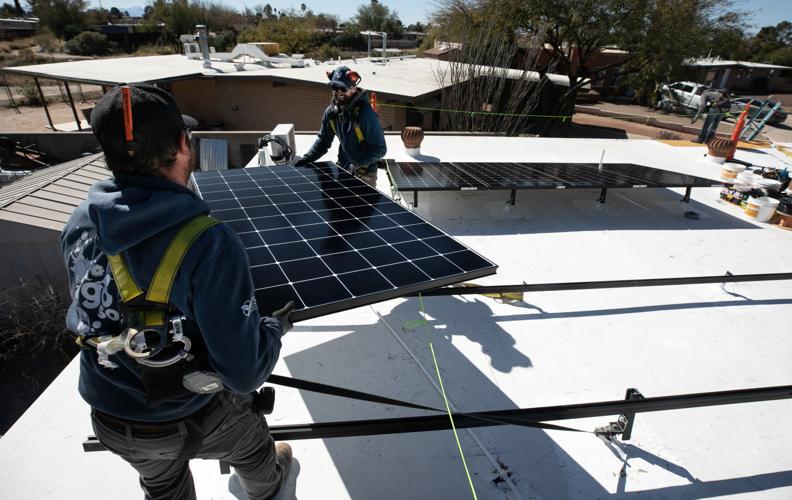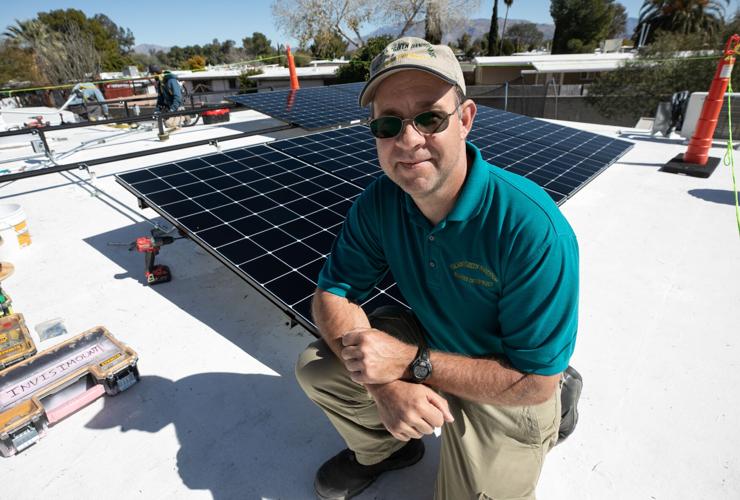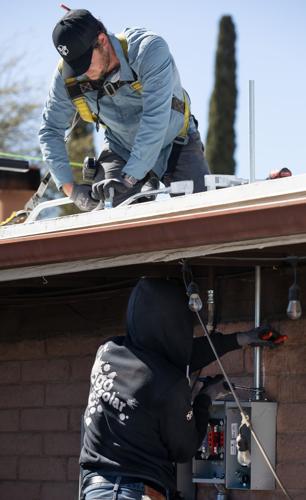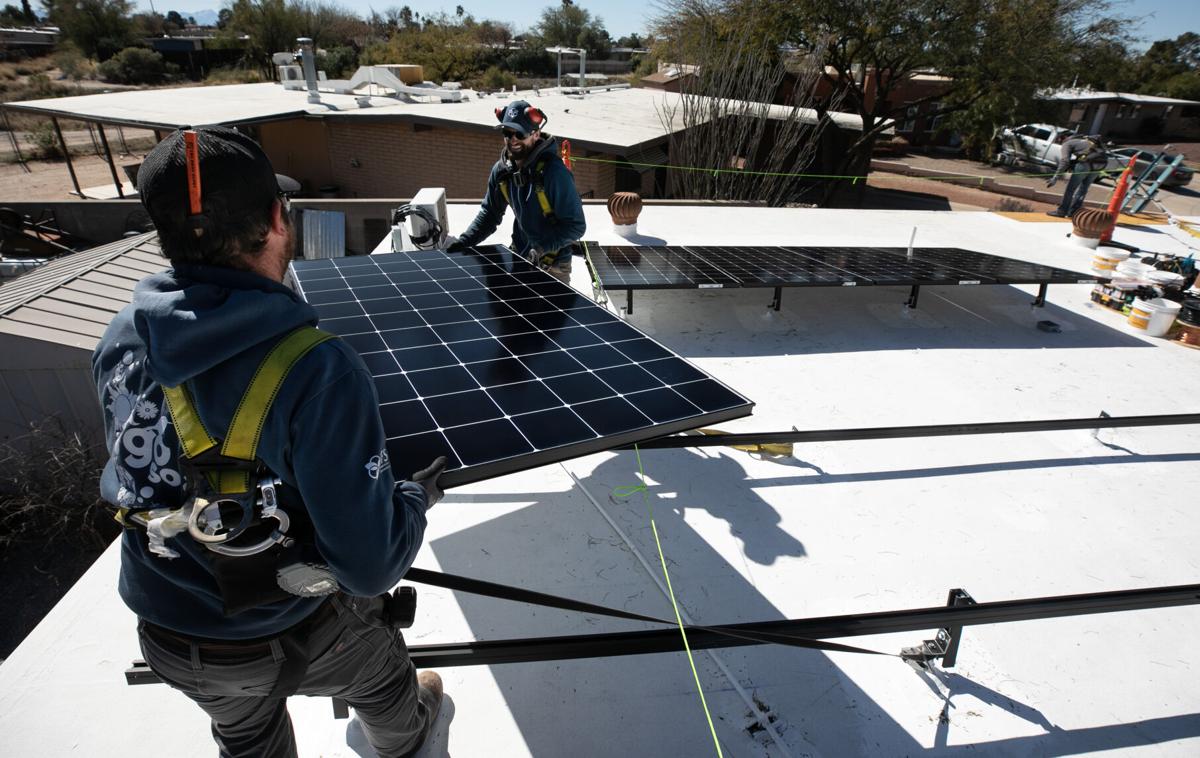Tucson-area homeowners can get help buying rooftop solar systems from a nonprofit that sets up buyers’ cooperatives to make sure consumers get a fair deal.
Solar United Neighbors is signing up members for its third annual co-op in Tucson, after two successful local co-ops helped more than 100 homeowners and businesses install solar since 2020.
For more information or to sign up, go to tucne.ws/solarcoop23. The deadline to sign up is April 7.
The 2023 Tucson solar co-op has funding available to help three low- to moderate-income households go solar, thanks to a local donor.
The solar co-op is free to join for individuals or small businesses, and together, co-op members learn about solar energy with no obligation to buy.
Each co-op forms a committee to take competitive bids from local installers in a process facilitated by Solar United Neighbors, then may purchase individual solar systems at a group price, the group says.
Consumer advocates say prospective solar buyers need to do their homework to make sure a deal makes sense, while some solar marketers have been hit with consumer-protection lawsuits for allegedly deceptive sales pitches and high-pressure sales tactics.
Adrian Keller, Arizona program director for Solar United Neighbors, said prospective co-op members often cite the confusing array of sales pitches and “disinformation” they’ve been served about rooftop solar.
“They get door-knockers, they get solicitor calls, and for people who aren’t well-versed in solar and who don’t have a lot of time to devote figuring that out, it can be a pain to figure out what to believe and what not to believe,” he said.
Solar United Neighbors doesn’t guarantee co-op members rock-bottom pricing but the bid vetting process assures members get a quality system at a competitive price, Keller said.

Homeowner Jesse Micander on his roof as workers from Technicians for Sustainability install new solar panels near South Prudence and East Escalante roads in Tucson on Feb. 16. Micander will have more power than he currently needs and a charging interface for a future electric vehicle.
Based in Washington, D.C, Solar United Neighbors was founded in 2007 and has hosted co-ops in a dozen states and Puerto Rico, helping nearly 8,000 homes and small businesses install solar.
It is funded nationally by the Leon Lowenstein Foundation, with other donors and local partners, including Sustainable Tucson, Physicians for Social Responsibility and the Sierra Club Grand Canyon Chapter. The group also collects a $600 fee from installers for each system installed.
Solar United Neighbors has hosted 11 solar co-ops in Arizona since 2019, helping 382 homes and businesses install 3 megawatts of solar power.
The group’s first solar co-op in Tucson in 2020 attracted 151 signups, resulting in 61 installations with owners investing $1.2 million and an estimated $2.1 million in savings for owners over 25 years.
A second co-op launched in 2021 that stretched into 2022 attracted 166 participants, resulting in 50 installs and more than $1 million invested, with projected 25-year savings of nearly $2 million.
Keller said boosted federal tax breaks for rooftop solar, as well as battery storage, is catalyzing high interest.
The federal tax credit for solar was being phased out and was scheduled to drop to 22% this year, but last year’s Inflation Reduction Act extended the credit and bumped it up to 30% while also including qualified energy-storage systems.
Arizona also offers a 25% solar tax credit up to $1,000, with exemptions from state sales tax as well as from higher property taxes due to increased home value because of new solar.
Marjorie and Michael Blaine joined the most recent Tucson co-op last year and decided to buy a 9.8-kilowatt photovoltaic system for their Foothills home through Tucson-based Technicians for Sustainability, which won bids for both of the earlier local co-ops.
The system cost about $26,000 and was turned on at their home in December, said Marjorie Blaine, a retired wildlife biologist.
The couple had been looking to install solar to lower their carbon footprint and save money down the road in retirement, and the co-op helped them understand their needs and the process, she said.
“I thought it was an absolutely great process, it was seamless, it was very detailed in the explanations,” Marjorie Blaine said. “It takes a big burden off the whole process, especially with something like solar, to have a committee that has looked at all of those bids, and they’re not looking at just the lowest bid.”
She said with federal and state tax credits, the couple is expecting the system to pay back its cost in savings in about eight years — perhaps sooner as Tucson Electric Power rates go up.
Consumer advocates say prospective solar buyers need to crunch the numbers to make sure a deal makes sense.

Sam O'Shell of Technicians for Sustainability, top, sets electrical conduit while Emmanuel Tuo installs the interface with the main panel during solar panel installation.
Kevin Koch, co-owner of Technicians for Sustainability, said the Solar United Neighbors program is particularly helpful for Tucsonans who are uncomfortable with choosing an installer on their own.
“The (bidding) process they employ brings together participants and SUN staff members to choose an installation partner, making it less likely that participants will fall prey to one of the many deceitful or ‘not in the customer’s best interests’ solar sales organizations which are out there these days,” said Koch, a longtime advocate of best practices and standards for solar installers.
Learn about the 2023 Tucson Solar Co-op and how it can help you go solar.






